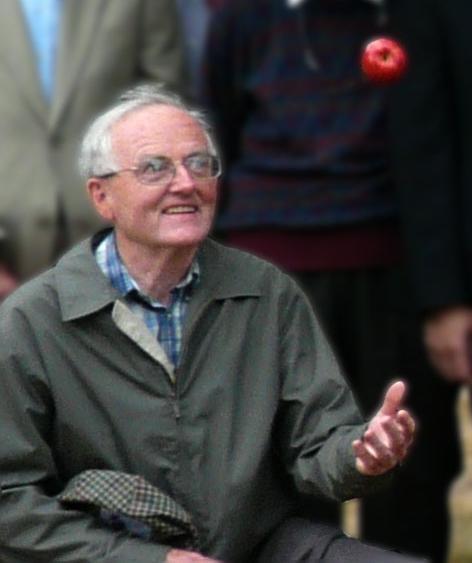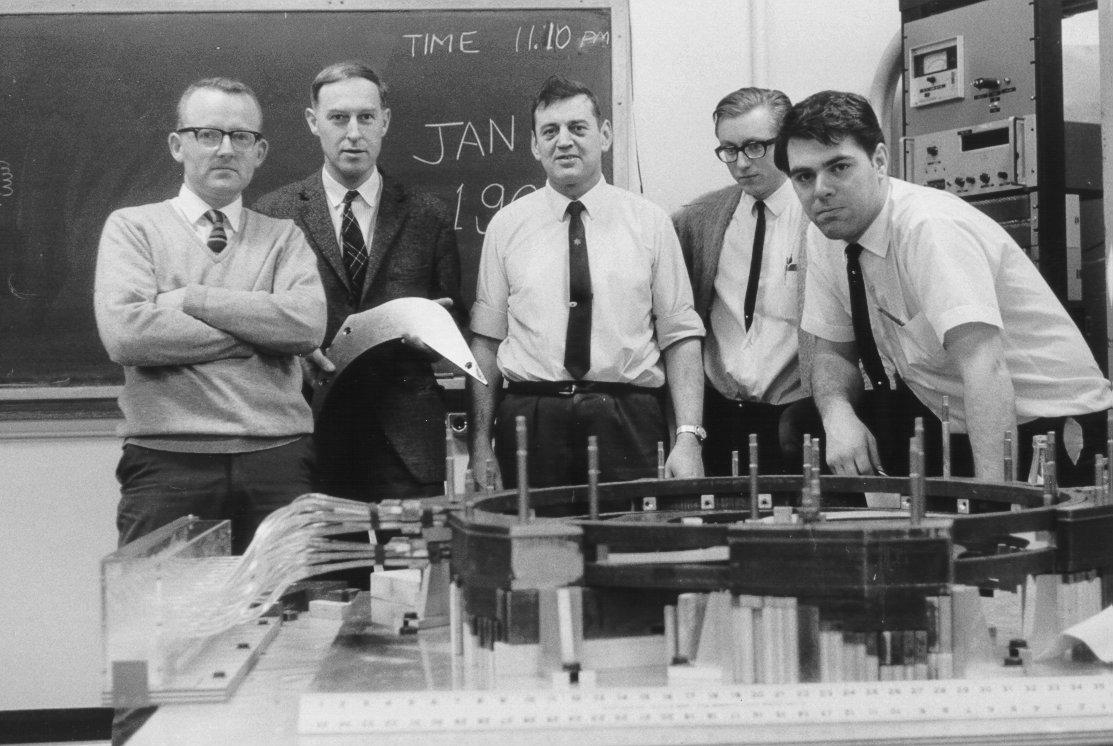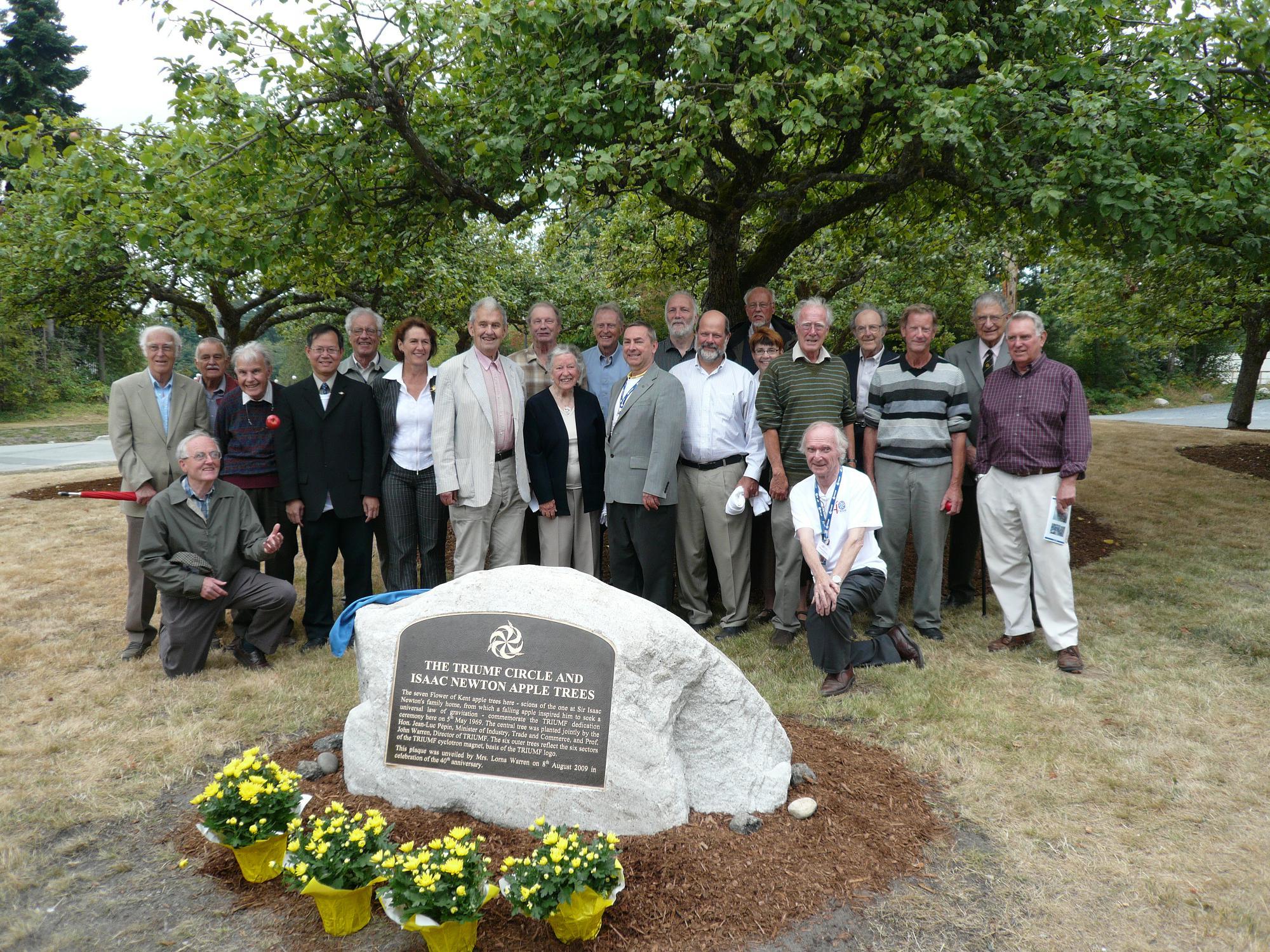 | |
| Auld (above) celebrates the 40th Anniversary of TRIUMF's commemoration and the planting of descendants of Newton's apple tree. |
It is with great sadness that we note the passing of Dr. Edward Auld, a pioneer who helped make TRIUMF a reality 40 years ago and who contributed significantly to the University of British Columbia (UBC) and TRIUMF communities over the past four decades. Auld passed away peacefully on Sunday, November 22, 2009.
"It is a great loss," said former TRIUMF Director Erich Vogt, who worked with Auld when he first came to TRIUMF to work on the design studies. "Ed was very well-liked, competent at what he did, always professional, and very gifted in both his design and research work. He was one of the real pioneers with TRIUMF and even after his time here he was always very closely connected to the laboratory."
Auld, a native of Chilliwack, B.C., attended UBC where he completed his B.A.Sc. in Engineering Physics. Even as a student, Auld was involved in the university community, having served as President of the Engineering Physics Undergraduate Society. In 1961, Auld completed an M.A.Sc. on the UBC 3-MeV Van de Graff accelerator.
After receiving his Ph.D. from the University of Southampton in 1964, Auld returned to Vancouver. In 1966, he was one of the first recruits (employee no. 2) to the fledgling TRIUMF organization, where he was given the daunting task of designing and building the exotically-shaped 6-sector cyclotron magnet.
Auld led the effort to design the magnet: the largest and most expensive component of the cyclotron. "This gigantic device, 18 meters in diameter and weighing around 4,000 tons, was not only a major engineering challenge but a major physics one as well," commented Mike Craddock, himself a TRIUMF original and colleague of Auld. "The magnetic field had to follow a precise pattern of variation in both radius and angle to an accuracy of 1 part in 10,000 over an area of 200 square meters. In the absence of the powerful computer programs available today, this required a meticulous program of modeling and measurement, and it's a great tribute to Ed's skill and determination that this extraordinary accuracy was eventually achieve," said Craddock. Eight major models and dozens of minor modifications were made before the magnet design was finalized.
 | |
Auld (left) with colleagues working on the design study of the cyclotron magnet. |
Once the cyclotron was operating, Auld joined Garth Jones in a program of experiments on pion scattering and pion production. Together they carried out some of the most important studies with pion beams.
As a physics professor in the Department of Physics and Astronomy at UBC from 1968, Auld's other great achievement was to rescue the Engineering Physics Program, which had nearly expired a few years earlier. "I remember giving a Directed Studies course to the one student in this program one year," mused Craddock. The program would never again experience such lows. Under the guidance and leadership of Auld as Director, a position he held for 18 years, the Engineering Physics program was built up into the flourishing enterprise it is today.
Auld also made a significant impression on the students he encountered during his years as Director. "Entering UBC Engineering in the early 1980s, it was well known that Engineering Physics was THE program to enter," remembers Marcello Pavan, TRIUMF's Outreach Coordinator. "On the one hand, it had a bit of a fearsome reputation as being very difficult. But on the other hand, it was being led by a director that everyone referred to as 'Uncle Ed'." Pavan first met Auld in late 1983, when he sought him out in order to transfer into the Engineering Physics program from Electrical Engineering. "My marks were only just barely good enough, yet he made me feel at ease from the moment I walked into the door, and he bent over backwards to accommodate me into his program. And it was the same every year since. Ed was a really great guy; great sense of humour, and it was always a treat to talk with him. He was an avid golfer, but I learned too late that he shared my addiction. I profoundly regret not being able to walk, talk, and laugh through a round with Uncle Ed. He will be sorely missed."
"Dr. Auld's expertise and commitment to excellence in designing the cyclotron magnet has enabled the TRIUMF cyclotron to run as the powerhouse of the laboratory for almost 40 years now," commented Dr. Nigel Lockyer, Director of TRIUMF. "His legacy has left an enduring impression on the TRIUMF community, and we wish to send our sincerest condolences to his family and friends."
 | ||
The UBC Department of Physics and Astronomy posted this memorial online on November 25.
Ed will be sorely missed in the Department of Physics and Astronomy. He was always, up until the last few days of his life, an extremely positive force who identified important goals and devoted himself tirelessly to realizing his vision. The various speakers at the recent "Auld Fest" made plain the enormous impact he had on students and TRIUMF, and so also on the Department.
His eighteen year service as Director of the Engineering Physics Programme was devoted entirely to maximizing all aspects of the students' experience at UBC. He is largely responsible for putting the Engineering Physics Project Laboratory on a rock solid foundation that has now served generations of FIZZ students. It was Ed who had the vision to integrate COOP seamlessly with the Engineering Physics curriculum, and later, Ed who gave the department Newsletter the momentum it maintains to this date.
Ed played an equally important role in designing and comissioning the main magnet in the TRIUMF cyclotron (he apparently was TRIUMF's 2nd employee in 1965!), and was a key player in many of the first physics experiments done at TRIUMF.
Thank you Ed, the department is in your debt.
Arrangements
At UBC, the BC Flag (Main Mall & Agronomy) will be lowered, Monday November 30, 2009 to mark the passing of Mr. Edward Auld.
A celebration of his life will be held at Dunbar Heights United Church, 3524 W 24th Ave, Vancouver, BC at 1:30 PM on 18 December, 2009. In lieu of flowers, donations may be made to The Salvation Army, Vancouver Food Bank, or The Edward George Auld Prize in Engineering Physics, Attn Rhonda Roth, Development Office, Awards, 500-5950 University Blvd, Vancouver, V6T 1Z3.
-- Meghan Magee, Communications Assistant, with contributions from Mike Craddock, Erich Vogt, Marcello Pavan, and Nigel Lockyer.
